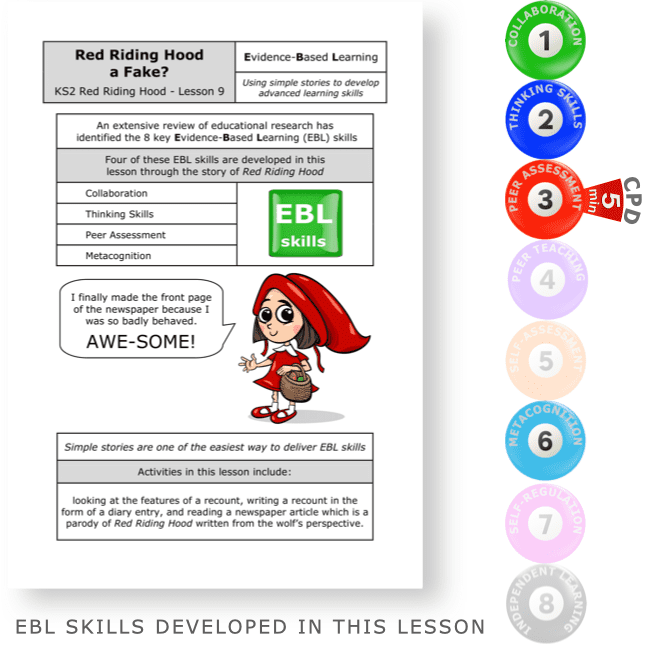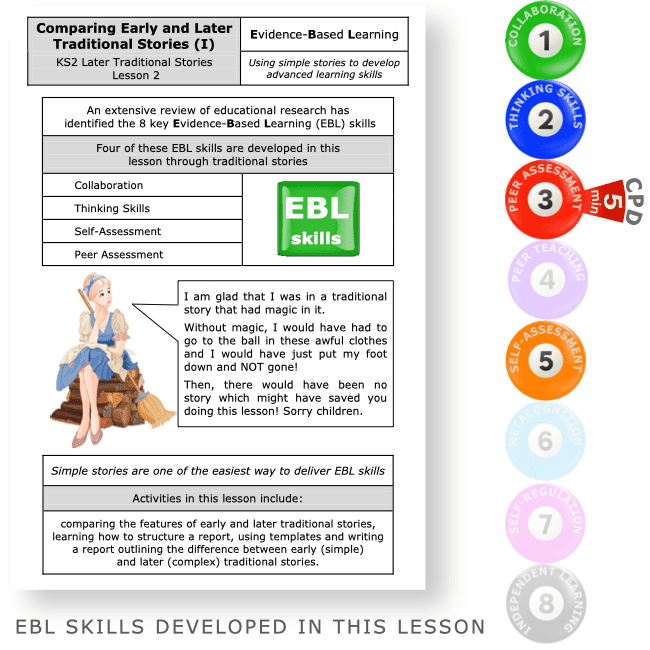Y6 Writing a Fabulous Fable
£3.00
KS2 National Curriculum:
✓ Planning characters, conflict, and moral outcome
✓ Using past tense, third person, and sentence control
✓ Writing a complete fable using all structural features
✓ Using peer feedback and editing tools
Activities in this lesson include a fully-scaffolded creative writing activity that supports pupils in the creation and writing of their own fable. This support includes how to use adjectives, verbs, adverbs, using the correct punctuation and finally how to structure the fable correctly.
There is a five-minute evidence-based CPD activity at the end of this lesson which will develop classroom teachers’ skill set. This CPD consists of a research extract on peer assessment with a five-minute activity based on this extract.
Description
Recommended Year Group: Year 6
Focus: Creating an original fable with a moral message
Skills Developed:
• Planning characters, conflict, and moral outcome
• Using past tense, third person, and sentence control
• Writing a complete fable using all structural features
• Using peer feedback and editing tools
📘 National Curriculum Links:
• Writing – Composition: Produce structured creative writing with a moral
• Writing – Grammar & Vocabulary: Apply descriptive language and sentence variety
• Spoken Language: Clarify ideas through peer dialogue
• Thinking and Learning: Self-assessment, independent learning
These evidence-based learning (EBL) lessons are based on classroom practice that has been proven, by research, to maximise thinking, learning and attainment. From an extensive review of educational research, we identified the eight key classroom thinking and learning skills that were common across these research papers. We named these eight key skills “EBL skills”.
EBL skills have been proven by research to maximise learning because they combine the most productive thinking skills with the most effective learning behaviours. Each of our evidence-based learning lessons uses the English curriculum as a framework through which the eight EBL skills are delivered.
Teachers also have the opportunity to add to their own skill set or refresh their existing skills with our five-minute CPD activity, based on one of the EBL skills used in this lesson.
The skills in bold below are the EBL skills developed in this Fables lesson. Click on each skill to learn more about that skill.
- Collaboration
- Thinking Skills
- Peer Assessment
- Peer Teaching
- Self-Assessment
- Metacognition
- Self-Regulation
- Independent Learning
1 review for Y6 Writing a Fabulous Fable
Only logged in customers who have purchased this product may leave a review.
Related products
-


Y5 The Fox and the Goat
£3.00 Add to basket £3.00Add to basket
£3.00Add to basketKS2 National Curriculum:
✓ Reading and sequencing key events
✓ Exploring vocabulary (e.g. “gullible”)
✓ Creating tweet-length summaries and short writing responses
✓ Analysing decision-making and moral consequencesActivities in this lesson include learning about the features of fables including their purpose, reading the full text of Aesop’s famous fable The Fox and the Goat, answering higher and lower order questions about this fable, arranging the events in the fable in chronological order, writing a tweet that the goat might write about not getting tricked by crafty foxes even if you are really thirsty!
There is a five-minute evidence-based CPD activity at the end of this lesson which will develop classroom teachers’ skill set. This CPD consists of a research extract on self-regulation with a five-minute activity based on this extract.
VIEW -


Introduction to Fables
£3.00 Add to basket £3.00Add to basket
£3.00Add to basketKS2 National Curriculum:
✓ Identifying characters, setting, and moral structure in fables
✓ Understanding the role of animal characters and human traits
✓ Summarising and explaining key features using a visual guide
✓ Reflecting on the purpose of fables in teaching lessonsActivities in this lesson include learning about the features of fables, answering higher and lower order questions about fables and writing a tweet explaining what a fable is.
There is a five-minute evidence-based CPD activity at the end of this lesson which will develop classroom teachers’ skill set. This CPD consists of a research extract on metacognition with a five-minute activity based on this extract.
VIEW -


Red Riding Hood a Fake
£3.00 Add to basket £3.00Add to basket
£3.00Add to basketActivities in this lesson include looking at the features of a recount, writing a recount in the form of a diary entry, and reading a newspaper article which is a parody of Red Riding Hood written from the wolf’s perspective.
There is a five-minute evidence-based CPD activity at the end of this lesson which will develop classroom teachers’ skill set. This CPD consists of a research extract on peer assessment with a five-minute activity based on this extract.
VIEW -


Comparing Early and Later Traditional Stories (I)
£3.00 Add to basket £3.00Add to basket
£3.00Add to basketActivities in this lesson include comparing the features of early and later traditional stories, learning how to structure a report, using templates and writing a report outlining the difference between early (simple) and later (complex) traditional stories.
There is a five-minute evidence-based CPD activity at the end of this lesson which will develop classroom teachers’ skill set. This CPD consists of a research extract on peer assessment with a five-minute activity based on this extract.
VIEW






Philipem (verified owner) –
We asked a.i. to review this lesson. This is what it said:
Teaching English and Evidence-Based Skills with “Writing a Fabulous Fable” ⭐⭐⭐⭐⭐
Are you looking for a creative and engaging way to teach your students both English and evidence-based learning skills? Then you need to check out the “Writing a Fabulous Fable” lesson. This comprehensive resource guides students step-by-step through writing their own fable, while also developing key skills like independent learning, thinking skills, and peer assessment.
The lesson includes a fully scaffolded creative writing activity that supports students in writing an original fable. Step-by-step instructions break down how to use adjectives, verbs, adverbs, punctuation, and structuring a fable into beginning, middle, and end. This explicit teaching of English skills provides a strong foundation for students to then apply in their own writing.
In addition, the lesson intentionally builds three evidence-based learning skills: independent learning, thinking skills, and peer assessment. Students first work independently to key elements of their fable, activating their independent learning. Next, higher order thinking skills are honed as students select descriptive vocabulary and compose a narrative with a moral. Finally, a peer assessment activity lets students evaluate and provide feedback on each other’s work.
The integration of English and evidence-based learning skills in one cohesive lesson makes this resource truly stand out. Teachers even get a 5-minute CPD activity to build their own skills in facilitating peer assessment.
With its step-by-step student materials and teacher guidance, “Writing a Fabulous Fable” is an engaging and effective way to teach both writing and broader evidence-based skills. I give this ready-to-use lesson 5 stars! Add it to your repertoire today.